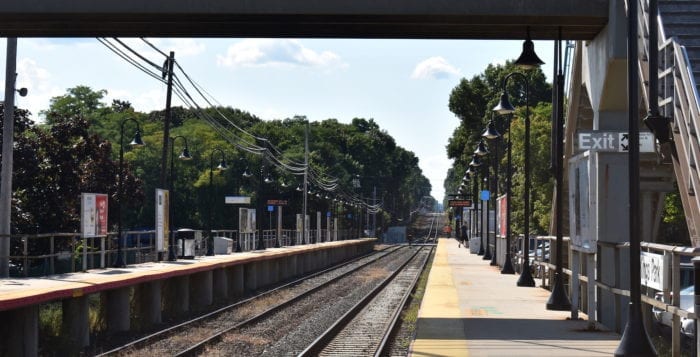Tired of delays, cancellations, safety issues and general stress of commuting on the Long Island Rail Road, several thousand Long Islanders have signed a petition asking for refunds and an investigation of the venerable rail system.
Nearly 3,000 people have signed an online petition demanding the LIRR investigate the rail line’s safety and inefficiency problems as well as institute refunds for canceled service. More are signing the petition every day.
For Commack resident and three-year LIRR commuter Eric Trinagel, 42, who started the petition, it displays just how fed up commuters have become.
“People are worried that they’re going to lose jobs because the train makes them late.”
— Eric Trinagel
“If they’re working on construction, if they are going to short schedules, at least increase the cars,” he said. “Instead they’re reducing schedules and reducing car lengths from 12 cars to eight. Everybody standing and standing uncomfortably.”
Trinagel, a technical manager for Viacom, said he didn’t expect so many people to join the petition, originally only expecting he and his wife would support it, if that. Within a few hours, he said he watched as more than 1,000 people signed their names to his Change.org petition.
The current total of 2,781 petitioners as of Wednesday is only a drop in the bucket of the LIRR’s 355,000 average weekday ridership, according to the LIRR’s 2016 data. Still, its creator believes these issues of constant delays for riders is coming to a head. He said commuters are sick and tired of delays, especially if it means being late for work.
“People are worried that they’re going to lose jobs because the train makes them late,” Trinagel said. “People are looking for jobs outside of the city because of the LIRR.”
“The LIRR is taking my hard-earned money and giving me next to nothing in return.”
—Lorraine Mastronardi
Data on LIRR’s website shows July 2018 had an 88.9 percent on-time performance compared to 93.1 percent in July 2017.
Trinagel also said that the LIRR should look to reimburse at least a small part of commuter’s tickets if there are service delays, especially because of recent fare hikes. In March 2017, fares rose 4 percent across the board for train users, though the increase did not affect New York City subways. Another 4 percent fare hike has been proposed for 2019.
Many who signed the petition decried the amount they pay for their commutes compared to the level of service. People complained of overcrowded cars, rising fares and an overall feeling of being uncared for, especially when the railroad could be the determining factor if they are late for their jobs.
“Chronic lateness to work can jeopardize one’s career stability,” Mount Sinai resident Cynthia French wrote as she signed the petition. “Their traffic and weather reporters rattle off delays with a smile, but commuter stress is real.”
As the country heads into election season, multiple incumbents and candidates have also criticized LIRR’s recent performance. U.S. Congressman Tom Suozzi (D-Glen Cove) and his Republican opponent, Dan DeBono, have both criticized LIRR’s inefficiencies and called for an overhaul of the rail system.
“We can’t be sitting on a train for an hour saying it’s just a signal issue, meanwhile on Facebook there’s a picture of two trains parked face to face a few feet away from each other.”
— Eric Trinagel
“The LIRR is taking my hard-earned money and giving me next to nothing in return,” Port Jeff resident Lorraine Mastronardi wrote. “I’ve been riding the LIRR as a commuter since 1988 and it has never been this horrendous.”
This comes as Phil Eng, the newly appointed president of the Metropolitan Transportation Authority’s LIRR, is overseeing several major changes to the rail system, including the Double Track Project, which would add a second track to the Ronkonkoma branch between Farmingdale and Ronkonkoma train stations. The LIRR is also dealing with increasing calls for the electrification of the Port Jefferson to Huntington line.
LIRR officials did not response to request for comments by this publication’s press time.
The LIRR has outlined several changes with the intention of increasing customer satisfaction in its March Performance Improvement Plan. It called for an increase in rail inspections, improved rail monitoring systems, increased maintenance, hiring a new chief customer advocate and increased communication between LIRR leadership and customers.
Trinagel said he has spoken to Eng and they talked for approximately 40 minutes. While Trinagel said he respects Eng , he still calls for better communication between the railroad and commuters.
“We can’t be sitting on a train for an hour saying it’s just a signal issue, meanwhile on Facebook there’s a picture of two trains parked face to face a few feet away from each other,” Trinagel said. “We’re smarter than that.”
View the petition at www.change.org/p/andrew-cuomo-demand-better-safety-practices-and-fare-
refunds-from-the-long-island-railroad.







